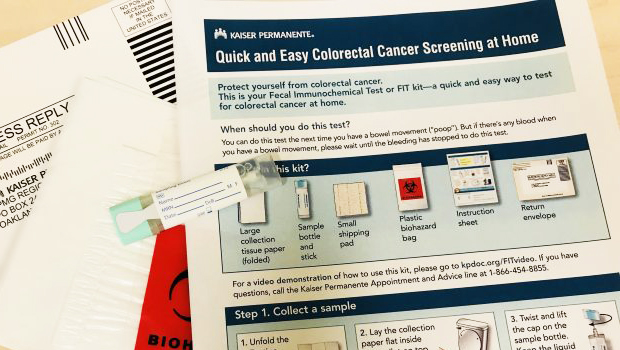From research to practice: Making colon cancer screening easier for patients

KPWHRI’s Kilian Kimbel reflects on how the SOS study helped pave the way for a new program to find and treat colon cancer early
By Kilian Kimbel, research writer/copywriter
At Kaiser Permanente Washington Health Research Institute, we all work together with the same end goal: to improve the health and lives of others. KP Washington’s new centralized FIT kit program provides a compelling example of how our research helps improve care at KP Washington and beyond.
FIT is short for fecal immunochemical test, a test that uses a stool sample to screen for colon cancer. I worked on a research study that helped lead to the new FIT kit program, which directly mails FIT kits to patients to boost screening rates. The study — called Systems of Support to Increase Colorectal Cancer Screening and Follow-Up (SOS) — aimed to increase colon cancer screening by mailing FIT kits to patients due or overdue for screening. Now, several years later, the research is being put into action in all KP Washington medical centers.
Bringing screening out of the clinic and into patients’ homes
The SOS study was a randomized controlled trial that was launched in 2008 by Beverly Green, MD, MPH, a family physician and KPWHRI senior investigator. The idea behind it was simple: We wanted to make colon cancer screening as easy as possible for patients to complete — and to continue to complete on a regular basis.
“It seemed to be a no-brainer,” said Dr. Green. “Bringing care out of the clinic and into patients’ homes would make screening easier to do, especially compared to other tests, such as a colonoscopy, which is an in-person procedure that requires preparation the day before the test. If I could screen for colon cancer without leaving the comfort of my own home, I would do that test. In fact, if the FIT was mailed to me when I was due for screening, I might be more likely to do it regularly and on time.”
But would direct mailing of FIT kits to patients actually boost screening rates? To find out, Dr. Green and our team recruited nearly 5,000 KP Washington members for the SOS trial, which compared usual clinic-based care (for example, discussions about screening during appointments and an annual physician-signed letter with a list of preventive tests that were due or overdue) to using electronic health record data and automated systems to mail FIT kits, provide follow-up screening reminders, and offer support to people due for screening.
“With usual care, when people show up in clinic, they may or may not be due for screening yet, or very overdue for screening, and people who don’t go to the doctor often may not be offered any screening tests,” Dr. Green said. “We harnessed electronic health record information to care for their ongoing health rather than just when they showed up in clinic.”
Bridging the gap between research and practice
Over the course of 9 years, SOS saw a more than 20% increase in screening by mailing FIT kits to patients at home compared to usual care. The study also showed that a centralized FIT mailing program increased regular on-time screening at recommended intervals, and dramatically decreased the number of people eligible for screening who had never been screened.
“The SOS study was very important and helpful,” said Susan Carol Bradford, KP Washington’s manager of Screening and Outreach Programs for Clinical Improvement and Prevention. “It not only showed the cost benefit of mailed FIT kits, but also provided information on preparing patients for the FIT kits arriving and encouraging their completion of the kits.” Bradford noted that in the new centralized program, KP Washington members ages 45 to 75 are eligible for FIT outreach if they are at average risk for colon cancer and due for FIT screening, or have had screening colonoscopies in the past but are now eligible to screen with a FIT.
From a clinic perspective, a centralized FIT screening program is not only efficient for the patient, but also saves time for physicians and other clinic staff to devote to other health care needs. When FIT kits are automatically mailed, clinic staff no longer routinely need to check whether the patient is due for a FIT, label the specimen vial, and hand out the kit during appointments.
“Physicians have a lot on their plate, and we have to do things to help their workload and help them figure out what can be done — for them and for their patients,” Dr. Green said.
What’s next for colon cancer screening?
Dr. Green sees expanding colon cancer screening as the top priority. “There's still disparity issues on coverage and out-of-pocket costs, and the uninsured have no benefits and may not be offered or be able to pay for colon cancer screening tests,” she said.
She also noted the importance of encouraging and supporting people to complete the entire screening process if they have a positive FIT result. This includes having further testing, like a colonoscopy, which is a test that looks at your entire colon to find abnormalities, including polyps and precancerous lesions, which can then be removed before they become cancer.
“We need more resources to focus on assuring people get a follow-up colonoscopy after a positive FIT result and identifying those who are at a higher risk of developing colon cancer, so we can find and treat cancer sooner,” Dr. Green said.
Thanks to the research team and nearly 5,000 patients who took part in the SOS study, KP Washington has the opportunity to find and treat colon cancer early, or prevent it altogether, by reaching more of its members through the new centralized FIT kit program. And, at KPWHRI, we are continuing our work to bridge the gap between research and practice and implement evidence-based strategies to save lives.
Healthy findings blog

Thanks to KPWHRI research, I helped save a life
Recruiting participants for a colon cancer screening study wasn’t easy. But a young interviewer discovered her work may have prevented someone’s untimely death.
innovating care

How to maximize screening for colon cancer
Research informs care as Kaiser Permanente Washington, exceeding 80 percent screening rate, launches home-based 'FIT First' pilot.
Cancer screening

A colon cancer screening program shows 5-year success
Home tests help people get recommended screening, Dr. Bev Green reports, supporting Kaiser Permanente programs that mail test kits to members


